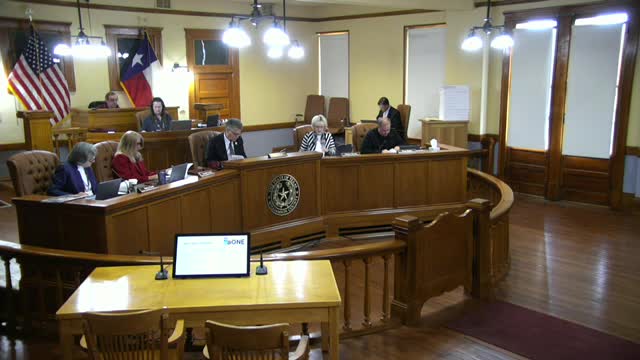Williamson County court officials ask outside review as commissioners split over new district court
Get AI-powered insights, summaries, and transcripts
Subscribe
Summary
Williamson County commissioners voted to seek a new district court in the next legislative session and unanimously approved an outside study of court caseloads; a separate plan to fund an associate judge and seek a 2027 court failed after split votes.
Williamson County commissioners on Jan. 14 voted to ask the Texas Legislature for a new district court and unanimously approved a request for an outside evaluation of local court case flow and judicial resources, but they split over an immediate funding plan to add an associate judge.
The court moved item 27 to an executive session under the Government Code real-property and attorney-consultation exceptions (Gov. Code §§ 551.072 and 551.071) before taking public action. In open session the court approved an out‑of‑procurement request to seek professional services or an RFP to evaluate case‑flow management and judicial resource needs for the Williamson County District Courts and County Courts at Law; that vote passed unanimously.
The request for an outside evaluation was described by commissioners and judges as a tool to inform whether the county should add courts or change docket management. County staff told the commissioners there is budget authority in fund 409 to hire the consultant. Commissioners also referenced outreach to the Office of Court Administration and to David Slayton, identified in the discussion as a court administrator with national experience, as part of background research on how other jurisdictions evaluate court needs.
During a lengthy discussion, court presenters and judges said local caseloads and case complexity have increased since the last time a criminal district court was created. Officials cited figures assembled for the court showing the district attorney’s office handled 766 felony cases in 1989 and 2,478 in 2024. The court also compared a 1989 homicide file to a modern case, noting the recent file contained thousands of pages (a cited example was 11,523 pages for a 2022 homicide matter) and referenced an increase in homicide filings from 4 in 1989 to 14 in 2024.
Commissioners debated two policy options. One proposal combined near‑term funding for an associate judge (AJ) to help with workload and a resolution supporting legislation that would authorize a new district court in the 2027 legislative cycle. The court recorded that the motion failed after two votes in favor and the remaining commissioners opposed.
A separate motion to send a resolution to the 2025 legislative session seeking creation of a new district court in Williamson County passed by split vote (recorded in open session as 3–2). The county did not specify in the meeting transcript which exact appropriation year would fund an approved new court; commissioners noted that the legislature generally implements new judgeships in October or on Jan. 1 following appropriation and that biennial timing is a factor in scheduling requests.
Commissioners and judges also discussed operational constraints that affect timing. Speakers noted current courthouse space limitations for judges, prosecutors and related staff, alternatives such as repurposing underused courtrooms and basement space, cost estimates to equip a courtroom for district-level matters (one figure discussed was roughly $80,000–$100,000 for necessary security upgrades), and a larger capital plan tied to a proposed new Justice Center. Several commissioners described associate judges as limited in authority because they cannot preside over jury trials, and said an AJ would provide partial relief but not the full capacity of an additional district judge.
The court directed staff to proceed with the outside evaluation via RFP or professional services agreement so the county will have external analysis of case-flow, docket management and recommended timing for any request for new judgeships. The evaluation was described repeatedly as intended to inform both near-term operational choices and longer-term strategic planning for the Justice Center and staffing.
No additional formal actions on item 27 were recorded in open session; the court recessed to executive session on multiple agenda items later in the morning and reconvened without further public action on item 27.
The discussion brought judges, the district attorney’s office and court staff into the public debate; county officials said they will use the consultant’s findings to shape any formal legislative request and to plan space and staffing changes needed if a new court is authorized.
